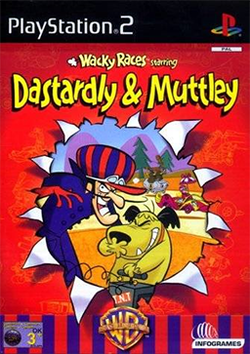Gameplay
The game includes two modes: Arcade and Adventure. Arcade mode features normal racing across various tracks. In Adventure mode, the player races on tracks to win gold stars or Wacky Trial clocks to unlock more tracks, abilities, and challenges. Wacky Trial clocks are rewarded when a race is won in a certain amount of time. These are needed to unlock boss challenges as well. Gold stars are needed to unlock various things, such as tracks and areas. They are gained by winning various events. Once 10 gold stars have been rewarded, the Boss Area is unlocked, in which the player must compete against one of three "elite" cars: Professor Pat Pending's Convert-a-Car, the Red Max's Crimson Haybailer, and the Mean Machine. Dastardly and Muttley are the main bosses of the game, with many of their power-ups geared towards attack.
Gadgets include an explosive mine that can be placed along the road, turbo speed, a temporary flying ability, and temporary invincibility. Pink discs known as "Tokens" float along the track. When picked up they fuel gadgets and give the player the option to perform one. Once they are used, they are shot out the back and left for other drivers to pick up.
All the vehicles and drivers from the cartoon are featured in the game, but there is only an eight-car grid, preventing them all from racing at once. The vehicles are put into five groups based on their acceleration, speed, and handling. The game features four themed levels, including a desert with Wild West towns and coal mines, snow-covered mountain towns, a Wacky Races version of Mount Rushmore, and a large city with rooftop race tracks (not featured in the Dreamcast version).
The game is notable for allowing players to have Dick Dastardly finally win a race. If the player wins as him, the narrator is taken aback or disgusted and Dastardly is happy and surprised at winning a race. [1]
This page is based on this
Wikipedia article Text is available under the
CC BY-SA 4.0 license; additional terms may apply.
Images, videos and audio are available under their respective licenses.
